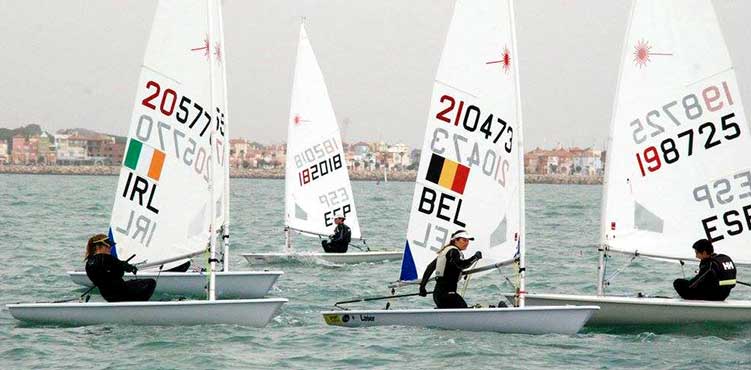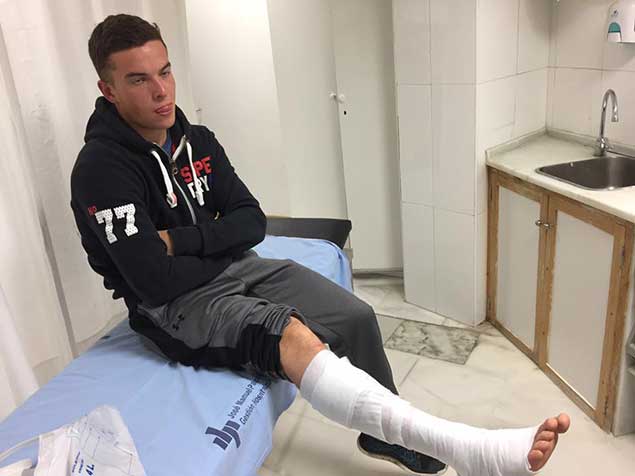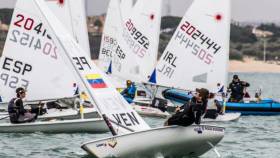Displaying items by tag: Andalusian Olympic Sailing Week
Irish 49er Teams (x5) Prepare for Palma Regatta, Laser Radial Sailors Look for Andalusian Winds
The Andalusian Olympic Sailing Week venue at Cadiz might have been a favourite with some of Europe's top Laser Radial sailing talent this week but it has not proved such a big hit in the wind stakes so far.
300 sailors and 50 coaches from 23 countries, among them Olympic medalists, and world champions have been sailing in Andalusia including eight Irish Radial sailors and ten Irish 49er sailors but its been a poor show for the wind with only two races completed after 'a long, long, long, long day' waiting for breeze on Sunday, according to one of the Irish entrants, Howth Yacht Club's Aoife Hopkins.
 Howth's Aoife Hopkins (205770) chases Evi Van Acker of Belgium (210473) the 2012 Olympic Bronze Medalist, in Cadiz this week
Howth's Aoife Hopkins (205770) chases Evi Van Acker of Belgium (210473) the 2012 Olympic Bronze Medalist, in Cadiz this week
It has been weak on the water for the Radials but it has proved equally frustrating ashore for other Olympic classes where organisers cancelled racing in the 49er, 49er fx, 470 m / w and 420 due to lack of entries.
49er Winter Training Camp
Since last December, Ireland's five 49er teams have been treating Cadiz as a Winter training base and continue to train there til Wednesday. The ten sailors will get their first taste of international battle in Spanish waters early next month when they relocate to the the much–hyped Palma de Mallorca regatta.
'It never gets easier, you just get better' declare Dun Laoghaire's Donnelly brothers, Tadhg and Sean, having completed an intense Winter period perfecting boat handling manoeuvres in the high speed skiff. Their last session in Cadiz was an intense 11–day affair. They're heading home now to the National Yacht Club for a well–earned week off before traveling out to Mallorca for their first regatta of their 2020 campaign.
The crews are under the watchful eye of Tytus Konarzewsk who is one of Europe’s most respected 49er sailing coaches.
Next stop Palma de Mallorca will be an important Irish 49er marker because the Donnelly's will be up against Irish rivals Ryan Seaton and Seafra Guilfoyle, Matt McGovern and Robbie Gilmore, Mark Hassett and Oisin O’Driscoll as well as Robert Dickson and Sean Waddilove who will – hopefully – all be in action at the first mens skiff test towards Tokyo 2020.
But before Howth Yacht Club's Dickson and Waddilove hit the water again, they also face a race back to fitness after a calf injury sustained in Cadiz by crew Waddilove who found out just how tough Olympic sailing can be, 49er style.
The accident happened last Wednesday, the first day back training at the February Training Camp. Waddilove explains: 'It was quite windy that day, up to 25 knots at times and I think we must have decided to bear away at one of these times. We almost had the boat flat downwind, almost ready to run in and hoist when a gust hit and we were flung back upwind and capsized to leeward. First protocol when this happens is to jump clear of the boat or climb down onto the dagger board if you can. However the force was so strong Rob ended up going through the main sail and I went to jump off the wing to windward but the force made it hard to jump far enough away from the boat so I ended up hitting my leg off the dagger board on the way down'.
 Sean Waddilove injury: 'My leg feels ok at the moment so I have been back training after a few light cycles, upper body gym sessions and a lot of icing, elevating and compression bandaging' Photo ISA/Facebook
Sean Waddilove injury: 'My leg feels ok at the moment so I have been back training after a few light cycles, upper body gym sessions and a lot of icing, elevating and compression bandaging' Photo ISA/Facebook
All the Irish 49er teams are claiming to have made 'really big improvements' over the past few months so there should be plenty of Irish mens skiff competition to come in March and the rest of the 2017 season.
Meanwhile, in the mens and womens Laser radial fleet, some well known names are finding the going tough in fickle Spanish breezes including 2012 Olympic bronze medalist Evi Van Acker of Belgium who is 17th on the mixed gender 114–boat scoresheet. (Downloadable results below). Ireland best results to date are Royal Cork's Johnny Durcan in 48th and Lough Derg's Aisling Keller 63rd.






























































